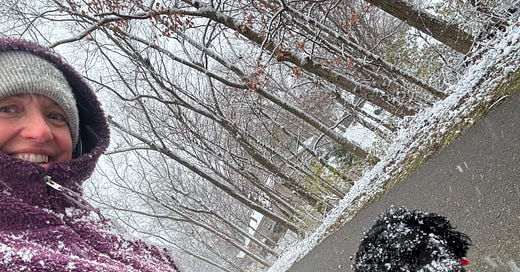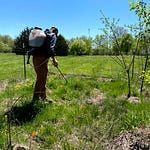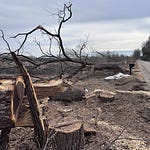This is the newsletter version of Sara by the Season, where I explore what is piquing my curiosity as I try to lean into nature’s wisdom and rhythms. You can listen to me read you the newsletter by hitting play above - or you can click the little link above and to the right to play in your favorite podcast player.
If you know someone who would like this sort of thing, I’d be so grateful if you would share it.

I had no idea who Alex Cooper was until Grant told me that Ice President Harris was doing an interview with her and that she had the most listened-to podcast by women on Spotify. So I listened to it, and it was a really good interview not surprisingly focused on women’s issues in advance of the election.
But the part I wasn’t prepared for was when Cooper asked Harris about how she felt when Governor Sanders critiqued Harris because she didn’t have kids to keep her humble.
I really don’t want to waste any words or energy on the stupidity and just plain mean-spiritedness of Sanders’ comments. But I did gasp out loud when Harris answered Jones:
“A whole lot of women out here are not aspiring to be humble.”
I gasped because it was so good to hear, but then I almost immediately second guessed myself, reminding myself that I try to be humble myself and encourage it in my children. My faith tradition elevates humility1, as do most spiritual traditions.
I’ve even always loved that the word comes from the Latin humus, meaning earth or soil, soil being one of my favorite things. Actual humility, for me, has something to do with this earthiness - of seeing ourselves as close and connected to the earth, not separated and superior to her. I firmly do believe that that kind of humility could begin to solve many of our collective problems.
I read Holly Whitaker’s Quit Like A Woman when it first came out, and the thing that has stayed the most with me from reading that book isn’t the dangers of alcohol, but her reframing of AA. In QLAW, she writes:
A 1979 history of AA, Not-God by Ernest Kurtz, derives its title from this concept as the basis of AA: “The fundamental and first message of Alcoholics Anonymous to its members is that they are not infinite, not absolute, not God. Every alcoholic’s problem had first been, according to this insight, claiming God-like powers, especially that of control.”
But women in 1935 America—even privileged white women—had no illusions that they were God. No woman in the history of the patriarchy has that illusion. We are second, always second, if not third or fourth or fifth depending on other intersections of identity. If being reminded of how much we are not God, how little control and power we have, or claiming our fallibility and insignificance and humility was the antidote to a drinking problem, women wouldn’t have drinking problems…
If you’re a woman, you’re most likely not wielding an ego so big it can’t fit through the door or suffering from a pathological lack of humility…From the outset, AA felt like the most oppressive thing I could do to my already oppressed spirit.
AA was created by an upper middle class Protestant white guy for other upper middle class Protestant white guys. I’m not arguing, nor is Whitaker, that AA hasn’t been a force for good for millions of people, but Whitaker helped me to see that the twelve steps are not prescriptive for everyone. A Black woman or Indigenous teenager doesn’t need to be humbled to find recovery; more likely, what they need is to learn more capacity for self-compassion and self-trust2.
What Harris did with her short rejoinder is remind women (and men) that women are free to not aspire to humility. Most men wouldn’t list humility as their life goal, and we don’t sit around judging them. If a man said what Harris did, I’m not even sure it would’ve made news, let alone sold out t-shirts in a matter of hours.
Harris’ phrase made news because the patriarchy has used humility as a weapon to keep women quiet, submissive, and at home. So to declare that there are a lot of women out here for whom humility is not their life goal is counter-cultural. It makes news and sells t-shirts.
What I loved about how Harris answered Cooper’s question is that she didn’t critique women who are aspiring to be humble; she just invited us to consider that there are plenty of women not aspiring to be humble. Maybe they’re aspiring to be compassionate or independent or honest or bold. Or free.
Iain McGilchrist is a philosopher, writer, neuroscientist and psychiatrist that is frequently referenced in conversations about the “crisis of meaning” that seems to dominate a certain segment of the predominantly white male intellectual space. I first heard of him via several podcasts referencing (worshipfully) his 2012 book, The Master and His Emissary: The Divided Brain and the Making of the Western World3. Last week, I read his interview in The Tablet, a Catholic magazine; the title was “Raging Against the Machine,” so there was no chance I wasn’t going to see what he had to say.
In the interview, he says, “Almost everything we’re taught…effectively, it’s about me, me, me…and we now find that we are the most miserable people that have ever lived. Surprise, surprise, we’ve cut ourselves off from the roots of fulfillment, which is oneness with nature, with the divine and with one another.” I would wholeheartedly agree, Mr. McGilchrist!
The interview was a precursor to a talk McGilchrist gave last weekend titled “The Future of Humanity.” In the interview, he said that he planned to focus on the following in his talk: “the opposite of life is not death, the opposite of life is mechanism…We are embracing the idea that we are machine-like…in the process, we’re losing our sense of wonder, we’re losing our sense of humility, we’re becoming hubristic.”
Again, I agree, but here is where I thought about Harris’ “not aspiring to be humble” line. Perhaps the Elon Musks, Peter Thiels, Donald Trumps and their legion of fans are becoming “hubristic,” but many of the women I encounter aren’t excessively proud or self-confident. They’re exhausted and angry. Even the Trump-voting women I know are anxious and tired more than they are excessively proud and self-confident.
I notice that many women writers and creators - myself included - often issue caveats and disclaimers that we’re only speaking out of our experience, not trying to force our expectations or conclusions on anyone else. I’m not sure I see that all too often from male writers and creators, but tell me if I’m wrong. Occasionally, I’ll think to myself that we shouldn’t have to “caveat ourselves” so much, but now I wonder if, instead, men should “caveat themselves” more. Maybe McGilchrist, instead of his proclamations that all people everywhere are self-absorbed and in need of humility, he should call out the people who are actually in need of humility, who are profiting from the individualistic culture we’re steeped in, who are forcing more mechanized lives down our throats because they can be capitalized in a way that more communal, nature-based ways of living cannot.
Women cannot be fully mechanized in ways that men can. Even if we never experience childbirth for ourselves, which is one of if not the earthiest, most simultaneously humbling and exaltant experiences in a human life, every month for much of our lives, we are reminded of our earthiness. We are largely the ones responsible for the earthiest, humblest, messiest, most basic tasks of being a human - feeding, cleaning, tending to our homes and those who share them with us. Perhaps it isn’t so much that people like McGilchrist need to talk to all of us about the need to reject the increasing mechanization of modern life, but he needs to talk to the people - who largely look like him and are more likely to listen to him! - who are ramming the mechanization and lack of care down our throats. He needs to speak to the people who have immense power and resources about the need to recover their sense of humility. Perhaps he should tell them to look to the women who are working to support themselves and their families while raising children while simultaneously caring for aging relatives while simultaneously helping out with the PTO or local legal aid society while simultaneously organizing church meal trains4.
Whitaker’s lesson in QLAW about AA was that AA doesn’t work for everyone because it was designed by a privileged white guy for other privileged white guys. She wasn’t saying that AA doesn’t work for plenty of people, but she did invite her readers to consider that if it doesn’t work for you, it might be a problem with AA, not you.
With one witty answer, Harris did the same. The reason women loved that answer is because she opened the door of possibility for all that should be available for women. Maybe we women should listen. And maybe the men should take care of their own instead of acting like their observations about what ails us apply to everyone equally.
I for one, am aspiring to be humble, but here’s my quick caveat: my version of humility has to do with getting earthier, with getting dirty and having fun, with getting down low instead of climbing up, with more being and not so much doing, with seeing how the view looks from the ground.
Scattering Seeds
I usually have stuff that I want to share that doesn’t fit in the main post + I’m always finding stuff that supports the thesis of the book I’m writing on the benefits of leaning into nature’s wisdom, so I thought I could start sharing those links and things here with all of you in hopes of some of the seeds I share germinating into something beautiful at your place.
What not to say. In honor of Indigenous Peoples’ Month and because next week is American Thanksgiving, Kaitlin reminds us what not to say all year long. This isn’t in the name of being politically correct; I’m sharing it because I thought we could all agree that we’re striving to be decent human beings, learning to do better as we go.
Gratitude season. I wrote this in 2020, but this formula I reference is still the thing I find to be most helpful about practicing gratitude.
Christmas ideas. If you’re shopping for the nature lover in your life, I can almost gaurantee they would love any of the following books - all of which will be at the top of my 2024 best of list: Robin Wall Kimmerer’s newest, Service Berry, Chris La Tray’s Becoming Little Shell, Shelley Reid’s Go As A River and Pam Houstin’s Deep Creek.
Types of humility. Researching this newsletter led me to this article from Greater Good that explains that there are - at least - eight different types of humility. It seems like an important part of any discussion around humility to make sure we’re all talking about the same thing.
Here’s to aspiring to be earthy,
Sara
Which is part of why I find their allegiance to a man who has never been humble a day in his life so enraging.
I would also argue that there are plenty of rich white men that need that too, but that is another newsletter.
I bought the book, but admittedly have been on page 44 since about 2021.
The reason I’m picking on McGilchrist is because he has become immensely popular among a segment of philosopher-types - again, mostly white men - that have moved from atheism or at least agnosticism to religiosity over the past several years. It isn’t that they have simply become more spiritual; they have in many cases been baptized and confirmed in orthodox traditions. Martin Shaw and Paul Kingsnorth come immediately to mind, but there is an entire documentary series and associated book and podcast digging into the phenomenon. Jordan Peterson often being included in these lists makes me extra squirmy for what it’s worth. McGilchrist himself is in this company, although he says that he was never an atheist.












Share this post